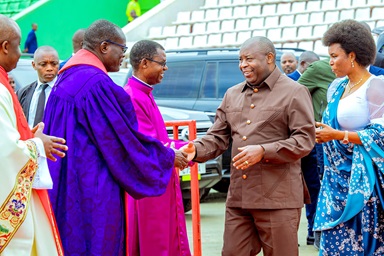Despite pressure to speed up the process, a standing legislative committee of The United Methodist Church on May 9 reconfirmed its plan to recommend five new bishops for Africa four years from now.
The issue of debate before the committee was not the need for new bishops in Africa — a fact given church growth there — but on the timeline with respect to areas of greatest need and ability to absorb the increased costs. General Conference will consider the committee recommendation during the meeting now underway here. The plan could become an issue of floor debate in the full legislative assembly that convenes every four years.
At stake legislatively is a “comprehensive plan for central conferences and episcopal areas in Africa” developed across the last few years by the Standing Committee on Central Conference Matters. “Central Conference” is the term United Methodists use to designate geographical regions outside the United States. A central conference is usually comprised of several smaller “annual conferences.” One or more annual conferences make up an episcopal area.
The standing committee comprehensive plan was challenged in the run-up to General Conference by several other proposals to name new bishops for particular countries or for Africa in general in 2016. These measures were referred to the standing committee for review, including the possibility of including parts in its own comprehensive plan.
Bishop Patrick Streiff of Central and Southern Europe, chair of the committee, allowed sustained and far reaching debate on whether the committee should amend its own plan. That plan calls for an increase of African bishops from 13 to 18 in the denomination’s budget beginning with the 2020 General Conference.
Possible modifications to the proposed plan included authorization of two new bishops this year and three more in 2020. One factor in the timeline, several speakers noted, was financial. United Methodist bishops are all supported out of an Episcopal Fund derived from contributions by congregations. Provisions for new bishops have not been factored into the draft budget for 2017-2020.
The vote to retain the comprehensive plan was 30 to 2. During debate, several African members of the committee rose to endorse the plan as fair and expedient. The standing committee is composed of one bishop, one clergyperson and one lay person from each U.S. jurisdiction and central conference, plus four additional members defined by roles in the church, for a total of 39 members.
Another issue in the discussion is that of the locations of new episcopal areas based on need. Alternative legislative proposals this year asked for new episcopal areas in Côte d’Ivoire, the Democratic Republic of Congo and Nigeria.
The standing committee’s comprehensive plan anticipates a systematic evaluation of possible new areas. The study group would be made up of one delegate from each African annual conference, all of the active bishops in Africa, plus up to 10 standing committee members from outside Africa. Costs for two such study committee meetings across the next four years would be derived from denominational general funds.
Wright is an information consultant with the United Methodist Board of Global Ministries.
Like what you're reading? Support the ministry of UM News! Your support ensures the latest denominational news, dynamic stories and informative articles will continue to connect our global community. Make a tax-deductible donation at ResourceUMC.org/GiveUMCom.



